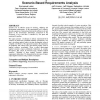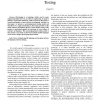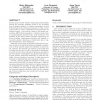5 search results - page 1 / 1 » Using the Language Extended Lexicon to Support Non-Functiona... |
WER
2001
Springer
13 years 9 months ago
2001
Springer
Although Non-Functional Requirements (NFR) have been present in many software development methods, they have been faced as a second or even third class type of requirement, frequen...
WER
2000
Springer
13 years 8 months ago
2000
Springer
Recently, it has been pointed out that the majority of the requirements engineering methods do not take into account non-functional requirements (NFRs) [10][11]. Consequently, we h...
ICSE
2005
IEEE-ACM
14 years 4 months ago
2005
IEEE-ACM
Scenarios are an effective means for eliciting, validating and documenting requirements. At the requirements level, scenarios describe sequences of interactions between the softwa...
ENGL
2008
13 years 4 months ago
2008
Prototyping is a technique widely used in many engineering fields. However, in software engineering, its usage is limited to requirement elicitation. Little research has been done ...
ATAL
2009
Springer
13 years 11 months ago
2009
Springer
Several agent-oriented software engineering methodologies address the emerging challenges posed by the increasing need of adaptive software. A common denominator of such methodolo...



